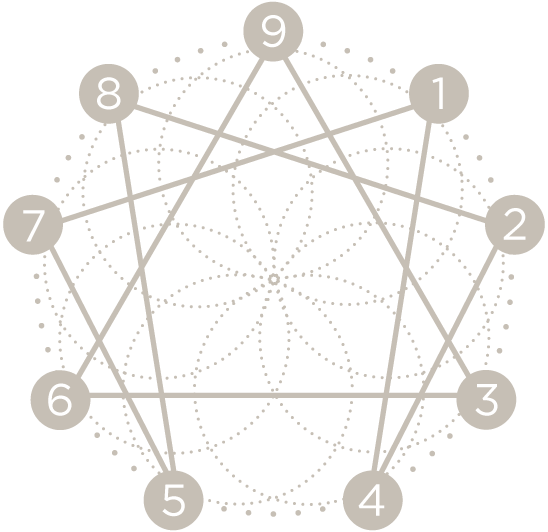After taking the Enneagram test, I was far from surprised to find out that I am a “Type Two” aka “The Helper”. The Helper is defined as the caring, interpersonal type. Twos at their best are empathetic and giving, supportive and nurturing. On the flip side, at their worst, they can be self-sacrificial (to a fault), needy and resentful. –more on this to follow. There has been so much buzz around this test that I had to try it for myself. The Enneagram has proven to be more eye-opening than I could have imagined! So if you are even as slightly as intrigued by this test as I am, first read this post (haha), and then go take it for yourself. Link listed below.
Better Understanding the Test
“The nine-pointed Enneagram symbol represents nine distinctive strategies for relating to the self, others and the world. Each Enneagram type has a different pattern of thinking, feeling and acting that arises from a deeper inner motivation or worldview.” Through the awareness of your own personality type, you can then cultivate better relationships, live a more fulfilling life and prosper within your true essence.”(https://www.enneagramworldwide.com/the-enneagram)

Type Two Healthy v. Unhealthy
As “Helpers”, twos exist to give. They are selfless and tend to be “people-pleasers” who have a hard time saying “no.” I resonate deeply with the need to give and “help” others as reflected in my jobs both at Orangetheory Fitness and the hospital. It brings me joy to serve others in a way that betters their life. However, it’s easy, in an unhealthy state, to take this too far. Twos have a tendency to sacrifice their own well-being for that of others. It too can be difficult to understand why others do not reciprocate or desire the same sense of giving as you. In the unhealthiest of states, this can lead to manipulative and destructive behaviors both inward and outwardly.
Unhealthy Cont.
I’ll dive a little bit deeper into one specific trait that stood out to me on the unhealthier side of a type two, eating/addictive disorders.
Not for a second do I think that any one test can give you all the answers nor is this coming from any sort of medical backing. But I think, among other things, that so much of what we go through and how we deal with things can be contributed to how our brains were wired from the moment we were born. Case in point, during some of my unhealthiest seasons of life I found myself at the mercy of an abusive relationship with food. And to be fair, why I chose to go down that road could be contributed to many components but it’s enlightening to know that there is potentially an underlying reason as to why I coped in the manner that I did.
This likely isn’t the case for everyone and likely, not all “twos” will suffer with an eating disorder. But it feels as though, through many factors, test included, that I am developing a deeper understanding of who I am thus better equipping me to combat the unhealthy traits that I tend to be drawn towards.
Type Two Traits
Below is a list of the unhealthy v. healthy traits demonstrated by a Type Two “Helper”:
- Unhealthy:
- Low Self-Esteem
- People-Pleasing/Can’t Say “No”
- Entitlement
- Prideful
- Dependent on Other’s Approval
- Healthy:
- Selfless
- Intuitive
- Friendly
- Generous
- Loving
- Relationship-Oriented
- Energetic
Type Two Growth
Not surprising, growth for a type two comes through addressing their own needs first. It’s important to know that taking care of yourself first and foremost is not selfish. In fact, by doing so, you are able to more freely be self-less in the acts you will go on to do for others. It too is necessary to understand why you are doing the acts that you are doing. ie: Do you really want to be doing “x” or are you simply doing “x” because you want something out of or in return for it? Once you’re able to understand the origin of your actions then you are able to best preserve your highest self.
Type Two In Relationships
Naturally, I had Thomas take the test along with me. His results named him a Type One, “Reformer”. In short, the “Reformer” is rational, idealistic and a perfectionist. Although both independent in many ways, twos are able to provide a nurturing side that compliments the lack of which ones typically allow themselves. (Sound like us? haha!) I have to laugh as I write this out. Our personality dynamics couldn’t be more spot on.
In all seriousness, not only does the test evaluate your compatibility with others but it also identifies potential trouble spots within your relationships. (Again, in our case…spot on) Without going into all of the boring details and more ways in which this test blew my mind, here are my final thoughts in regards to relationships. This test in no way, shape or form holds all of the answers to finding your perfect match. But I do think that with a better understanding of the traits that you both possess, you are able to acknowledge vulnerabilities, counteract adversity and flourish in a healthy and fulfilling relationship.
What I Like About the Test
No one can be placed in a ‘box’ that defines who they are and what they are capable of, especially based on some test you take online. But I do think that this test (to which is eerily accurate) can aid in self, business, and relational growth. If you can better understand who you are, why you do what you do and how you relate with others (good and bad), we can all be better equipped with tools to negate our unhealthy sides and progress towards our healthiest selves.
Other Personality Types
Briefly, here are a list of the 9 personality types. To ensure accuracy, I am sharing exactly as they’re described by the Enneagram Institute descriptions. For more info on these types head to enneagraminstitute.com/type-descriptions.
- The Reformer: The Rational, Idealistic Type: Principled, Purposeful, Self-Controlled, and Perfectionistic
- The Helper: The Caring, Interpersonal Type: Demonstrative, Generous, People-Pleasing, and Possessive
- The Achiever: The Success-Oriented, Pragmatic Type: Adaptive, Excelling, Driven, and Image-Conscious
- The Individualist: The Sensitive, Withdrawn Type: Expressive, Dramatic, Self-Absorbed, and Temperamental
- The Investigator: The Intense, Cerebral Type: Perceptive, Innovative, Secretive, and Isolated
- The Loyalist: The Committed, Security-Oriented Type: Engaging, Responsible, Anxious, and Suspicious
- The Enthusiast: The Busy, Fun-Loving Type: Spontaneous, Versatile, Distractible, and Scattered
- The Challenger: The Powerful, Dominating Type: Self-Confident, Decisive, Willful, and Confrontational
- The Peacemaker: The Easygoing, Self-Effacing Type: Receptive, Reassuring, Agreeable, and Complacent

[…] should be looked at as an essential piece of one’s mental health puzzle. And speaking to all my fellow Enneagram 2’s out there, if you aren’t taking care of yourself, you are aren’t truly, and fully able […]